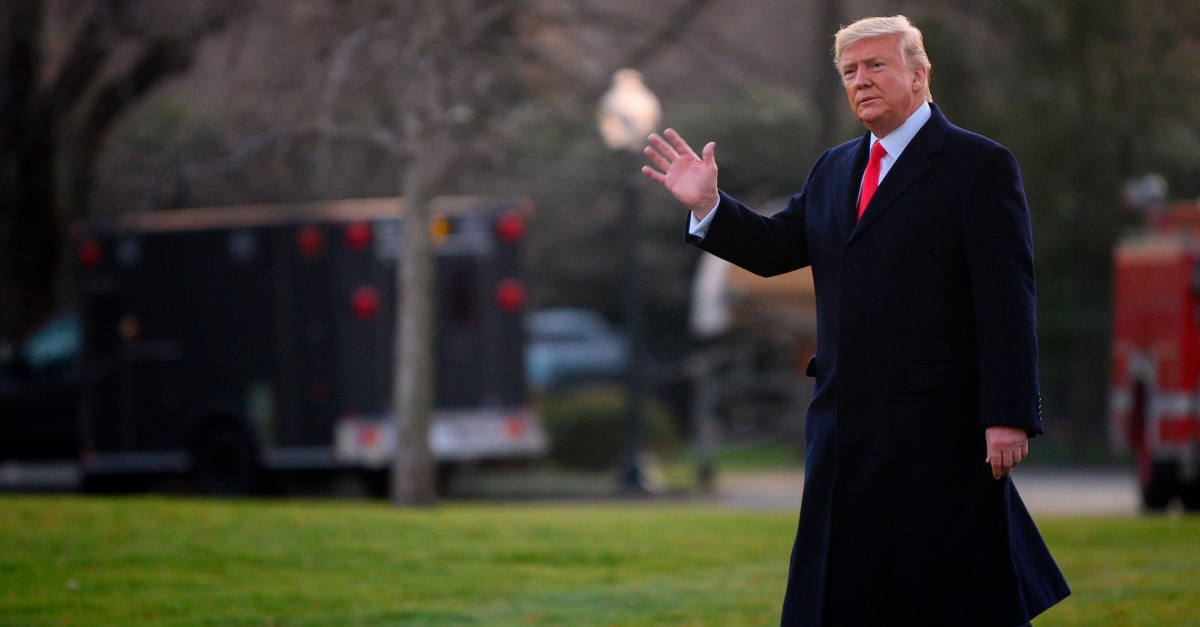
What did John Bolton know and when did he know it? If President Donald Trump has his way, it could be that the impeachment trial in the Senate won’t be the forum we learn of such things.
Did President Trump, with his Friday comments, just ensure that we will soon go back to square one re: Bolton testimony? Trump told Fox News’s Laura Ingraham that he thinks he has to invoke executive privilege over Bolton’s testimony — “for the sake of the office” of the presidency.
“You can’t be in the White House as president — future, I’m talking about future, many future presidents — and have a security adviser, anybody having to do with security, and legal, and other things [testify].” Some immediately noted that Trump said just the day before that he didn’t plan to try and prevent Bolton from testifying.
Bolton is the then-Trump national security adviser who wanted “no part of the drug deal Sondland and Mulvaney [were] cooking up,” namely: pressuring Ukraine to announce investigations of the Bidens and the debunked CrowdStrike conspiracy theory that Ukraine, not Russia, interfered in the 2016 election. Needless to say, this is an issue central to the House’s impeachment case.
Despite this, the House did not subpoena Bolton and he completely dodged the House phase of the impeachment inquiry. Bolton excused his radio silence by saying he was waiting for separation of powers issues to be resolved in Dr. Charles Kupperman’s lawsuit. Kupperman, a former Bolton deputy, sought an authoritative and binding judicial ruling to resolve the question of whether he was constitutionally obliged to testify in the impeachment inquiry or to abide by President Trump’s directive not to testify.
After that lawsuit was dismissed as moot, legal experts said that Bolton no longer had an excuse not to testify. Shortly thereafter, Bolton announced that he would testify in the impeachment trial if the Mitch McConnell-led Senate issued a subpoena.
“The House has concluded its Constitutional responsibility by adopting Articles of Impeachment related to the Ukraine matter. It now falls to the Senate to fulfill its Constitutional obligation to try impeachments, and it does not appear possible that a final judicial resolution of the still-unanswered Constitutional questions can be obtained before the Senate acts,” he said. “Accordingly, since my testimony is once again at issue, I have had to resolve the serious competing issues as best I could, based on careful consideration and study. I have concluded that, if the Senate issues a subpoena for my testimony, I am prepared to testify.”
Some read that, let out deep sighs, and said fiiinnnallly.
Law&Crime didn’t view it that way, suggesting instead that Bolton may have laid the groundwork for another protracted fight. The White House asserting executive privilege over Bolton’s testimony is important because it creates another “competing issue” for Bolton, and we’ve seen how he’s responded to those before: by doing nothing.
CNN legal analyst and impeachment expert Ross Garber explained both what Trump was saying and what Bolton is able to do — if he wants to.
“Trumpslation: Hell no, Bolton isn’t testifying,” he said, adding, “(FWIW, Trump almost certainly can’t ‘block’ a willing former admin official from voluntarily testifying in a Senate trial about non-classified info.)”
So what is the key question here?
For Garber, it’s whether “Bolton’s recent statement means he’d disregard Trump’s privilege assertion” or if he meant “he wouldn’t claim complete immunity (but could still refuse to answer questions where privilege is asserted).”
“If the latter, Bolton’s testimony would be fruitless,” Garber continued. “Enforcement could result in lengthy litigation. So Trump is giving Senate an excuse to not subpoena him at all (House, which is controlled by Ds, decided not to subpoena Bolton when WH asserted immunity/priv[elege]).”
While Speaker of the House Nancy Pelosi (D-Calif.) is expected to transmit the articles of impeachment to the Senate as soon as next week, Sen. McConnell has ensured that there will be no agreement on witness testimony ahead of the trial. What this means is a trial operating under the Clinton rules, in which the Senate would not decide whether to hear from witnesses until after the chamber hears opening arguments from House impeachment managers and attorneys representing President Trump.
That means witness testimony will be subject to a vote; therefore, witnesses may be called. Any lengthy legal fight over Bolton’s testimony would clearly complicate matters. Could it mean it we won’t hear from Bolton at the trial at all?
Another thing to consider is that McConnell is openly coordinating with the White House on the impeachment trial. Will McConnell do as Garber suggests and see the White House’s invocation of executive privilege as an excuse not subpoena Bolton?
For what it’s worth, Bolton left a message for McConnell before announcing publicly that he would comply with a Senate subpoena. He didn’t inform the White House.
Yet another thing to consider is how the issue of executive privilege will be raised at the trial, and what might unfold after that.
[Image via Jim Watson/Getty Images]
Have a tip we should know? [email protected]